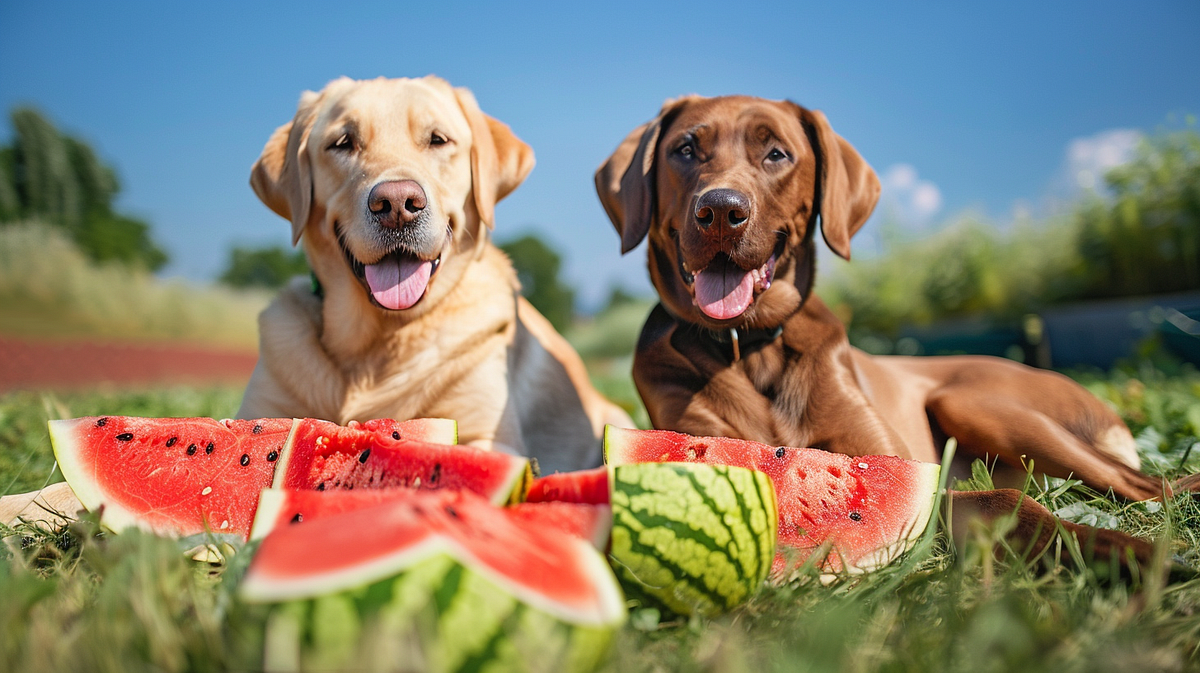Can Dogs Eat Watermelon? The Facts About This Juicy Fruit

Can Dogs Eat Watermelon? Yes, watermelon is safe for dogs when served properly. This juicy fruit can be a delightful treat for your furry friend, especially during hot weather.
Just make sure to remove the seeds and rind to prevent choking and digestive issues. Offer watermelon as an occasional, low-calorie snack, and your pup will enjoy this refreshing treat!
So, let’s explore together that- can dogs eat watermelon?
Nutritional Value of Watermelon for Dogs
Watermelon is more than just a refreshing summer treat for humans; it can also be a nutritious addition to your dog’s diet. When considering whether can dogs eat watermelon, it’s important to understand the specific nutritional benefits it offers. Here’s a breakdown of why watermelon can be a healthy choice for your furry friend.
Hydration
High Water Content:
- Watermelon is composed of over 90% water, making it an excellent way to keep your dog hydrated, especially during hot weather or after exercise.
- Vitamins and Minerals
Vitamins A, B6, and C:
- Watermelon is rich in essential vitamins:
- Vitamin A supports eye health and immune function.
- Vitamin B6 plays a role in brain function and helps in the production of neurotransmitters.
Vitamin C acts as an antioxidant, promoting overall health and aiding in tissue repair.
Potassium:
- This mineral is crucial for maintaining proper muscle function and regulating blood pressure. Potassium helps support your dog’s heart and overall cardiovascular health.
Antioxidants:
- Watermelon contains several antioxidants, including lycopene and beta-carotene. These compounds help combat free radicals in the body, reducing inflammation and promoting cellular health.
Low-Calorie Snack
Low in Calories:
- With its low-calorie content, watermelon makes for a great treat for dogs that need to manage their weight without sacrificing taste or nutrition.
Can Dogs Eat Watermelon? Incorporating watermelon into your dog’s diet can provide a range of health benefits, from hydration and essential vitamins to antioxidants and potassium. When fed in moderation and with the seeds and rind removed, watermelon can be a delightful and nutritious snack that supports your dog’s overall well-being. Always consult with your veterinarian if you have concerns about introducing new foods into your dog’s diet.
Health Benefits of Watermelon for Dogs-Can Dogs Eat Watermelon
When considering whether can dogs eat watermelon, it’s important to highlight the numerous health benefits this juicy fruit can offer. Not only is watermelon a tasty treat, but it also provides several nutritional advantages that can enhance your dog’s overall health. Here’s a closer look at the key benefits of watermelon for dogs.
Hydration
Excellent Hydration Source:
- Watermelon is composed of over 90% water, making it an ideal snack for keeping your dog hydrated, especially during hot summer days or after physical activities. Proper hydration is crucial for maintaining your dog’s energy levels and supporting bodily functions.
Low in Calories
Weight-Friendly Snack:
- Watermelon is low in both calories and fat, making it a great option for dogs that need to watch their weight. It provides a satisfying treat without the added calories that can contribute to obesity. This makes watermelon an excellent choice for dogs on a weight management plan.
Antioxidants
Rich in Antioxidants:
- Watermelon contains antioxidants, such as lycopene and beta-carotene, which can help combat inflammation in your dog’s body. These antioxidants play a role in reducing the risk of chronic diseases and promoting overall wellness by supporting the immune system and improving cellular health.
Can Dogs Eat Watermelon? Watermelon is not only a refreshing treat but also a beneficial addition to your dog’s diet. Its hydrating properties, low-calorie content, and antioxidant benefits make it an excellent choice for pet owners looking to provide healthy snacks. Just remember to feed watermelon in moderation and always remove the seeds and rind for safe consumption. Your furry friend will likely enjoy this nutritious and tasty snack!
Risks and Precautions When Feeding Watermelon to Dogs
While watermelon can be a healthy and hydrating treat for dogs, it’s essential to be aware of the potential risks involved. Understanding these risks will help you ensure your dog enjoys watermelon safely and without any adverse effects. Here are the key considerations regarding the risks and precautions when asking, can dogs eat watermelon?
Seeds
Intestinal Blockages:
- Watermelon seeds can pose a significant hazard, particularly for small dogs. If swallowed, seeds may cause intestinal blockages, leading to discomfort and requiring veterinary intervention. Always ensure that the watermelon you offer is seedless or carefully remove all seeds before serving.
Rind
Digestive Issues and Choking Hazards:
- The rind of the watermelon is tough and difficult for dogs to digest. Feeding your dog the rind can lead to gastrointestinal upset or even choking. To avoid these issues, always discard the rind before giving watermelon to your dog.
Overfeeding
Digestive Upset:
- While watermelon is low in calories, overfeeding can still lead to digestive problems due to its high water and fiber content. If your dog consumes too much watermelon, they may experience diarrhea or bloating. To prevent this, offer watermelon in moderation and observe how your dog reacts to it.
While watermelon can be a delicious and beneficial snack for dogs, it’s crucial to take certain precautions. By removing seeds and the rind and serving the fruit in moderation, you can minimize the risks associated with feeding watermelon to your dog. Always monitor your pet after introducing any new treat to ensure their safety and well-being.
How to Safely Serve Watermelon to Your Dog
When it comes to treating your dog to watermelon, ensuring their safety is key. Watermelon can be a refreshing snack, especially on hot days, but it’s important to prepare it properly. Here’s how to safely serve watermelon to your dog while considering the question, can dogs eat watermelon?
1. Preparation
Cut into Bite-Sized Pieces:
- Begin by cutting the watermelon into small, seedless, bite-sized chunks. This makes it easier for your dog to chew and prevents any choking hazards.
2. Avoid the Rind
No Rind:
- Always remove the rind before offering watermelon to your dog. The rind is tough and can be hard for dogs to digest, potentially leading to stomach upset or choking.
3. Supervision is Key
Monitor While Eating:
- Supervise your dog while they enjoy their watermelon treat. This way, you can quickly intervene if they start to choke or if any other issues arise.
4. Chilled Treats
Freeze for Extra Fun:
- For a cool summer treat, consider freezing watermelon chunks or pureeing them into a smoothie or popsicle. This not only makes for a delightful snack but also helps keep your dog hydrated during warm weather.
By following these steps, you can safely serve watermelon to your dog and let them enjoy the benefits of this delicious fruit. Always remember to introduce any new food slowly and watch for any signs of sensitivity or discomfort. With the right preparation, watermelon can be a fantastic addition to your dog’s diet!
Other Safe Fruits for Dogs
When it comes to treating your furry friend, there are plenty of safe and nutritious fruit options beyond watermelon. Incorporating fruits into your dog’s diet can be a healthy way to provide essential vitamins and hydration. Here’s a closer look at some safe fruits and what to avoid, all while considering the question, can dogs eat watermelon.
1. Safe Fruit Options
Apples (without seeds):
- Apples are a great source of vitamins A and C, and they also provide fiber. Just be sure to remove the seeds and core, as the seeds can be harmful.
Blueberries:
- Blueberries are packed with antioxidants, which can help support your dog’s immune system. They’re low in calories and make for a perfect treat.
Strawberries:
- Strawberries are not only delicious but also rich in vitamin C and fiber. They can be served fresh, and your dog may enjoy them frozen as a cool treat.
2. Fruits to Avoid
Grapes and Raisins:
- These fruits can be toxic to dogs and can lead to kidney failure. It’s best to avoid them entirely.
Cherries:
- While the flesh of cherries may be safe in small amounts, the pits contain cyanide, which is harmful to dogs.
Avocados:
- Avocados contain a substance called persin, which can be toxic to dogs in large quantities. It’s best to steer clear of avocados.
3. Introducing New Fruits
Slow Introduction:
- When introducing any new fruit to your dog’s diet, do so gradually. Start with small amounts and observe for any signs of allergies or sensitivities, such as itching, vomiting, or diarrhea.
Conclusion
Fruits can be a tasty and healthy addition to your dog’s diet, but it’s essential to choose safe options and be mindful of what to avoid. Always keep in mind the question, can dogs eat watermelon? While watermelon is safe in moderation, many other fruits can provide similar benefits. By offering a variety of safe fruits, you can enhance your dog’s diet while keeping it enjoyable!



